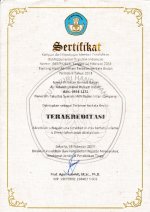Implementation of Faraidh's Provisions in Hibah Wasiat (A Case in South Banjar Kalimantan)
Abstract
This research illustrates the practice of inheritance in the Banjar community of South Kalimantan. The aim is to see the extent to which the provisions of Islamic inheritance law (farāidh) are applied by the member of society in everyday life. This phenomenon is revealed through several field research methods, especially in-depth interviews, the results of which are then analyzed to obtain conclusions. This study found the fact that although in general, the majority of Banjar people of South Kalimantan resolved their inheritance cases by farāidh (Islamic inheritance law), there was a tendency for some citizens to put forward the spirit of "Badamai (Keeping Peace)" to bring up ways of resolving inheritance cases that seemed varied and unique. In such a model, the formulation of the inheritance distribution specified in the farāidh is not fully implemented but is modified through the hibah wasiat (testamentary grant) method. In the case of ashābah bi al-ghair (heirs of a different gender), the pattern of division of "two to one" is not carried out by the mushi (testator) because of certain reasons/considerations related to the real condition of the heirs (economic level, marital status, age, etc).
Keywords
Full Text:
PDFReferences
Amin, M. Nur Kholis Al, ‘Hibah Orang Tua Kepada Anak Sebagai Pengganti Waris (Telaah Hermeneutika Terhadap Pasal 211 Kompilasi Hukum Islam)’, Al-Ahwal: Jurnal Hukum Keluarga Islam, 6.1 (2016), 29–44.
Franciska, Paula, ‘Wasiat Kepada Ahli Waris Menurut Kompilasi Hukum Islam dan Kitab Undang-Undang Hukum Perdata’, NOTARIUS, 11.1 (2018), 115–29 .
Hj. Wahidah, Hj Wahidah, and Hj. Faridah, Praktik Penyelesaian Harta Warisan Pada Masyarakat Banjar (Antasari Press Banjarmasin, 2018) .
Interview by phone with Zh (youngest child), and Mhr. (the eldest) of the St. Rph., and Ast., On 31 August, and 1,2 September 2018, along with other heirs, namely the daughters of the heir and daughter-in-law.
Interview with Eff’s on 7-9 September 2018 at Sari gading street, Banua Budi Village, Barabai District.
Interview with Nr., an alumnus of the Islamic faculty of IAIN Antasari Banjarmasin, on 18 and 19 August 2018) at his residence in the village of Hamalau, together with My. (wife of Nr), Uw., Krd, (uncles) Is., Hnd, Mrd. Frd., (aunts), Uyn, Hny., Mrgt, and Iyl (cousins).
Maimun, ‘Pembagian Hak Waris Terhadap Ahli Waris Beda Agama Melalui Wasiat Wajibah Dalam Perspektif Hukum Kewarisan Islam’, ASAS, 9.1 (2017) .
Ministry of Religion Report, ‘Penerapan Hukum Waris di Kalimantan Selatan’.
Muhammad Ibn Abi Bakar Ayyub Zar’i Abu Abdillah, I’lam al Muwaqqiin an Rabb al ‘Alamin, Beirut: Dar al-Jabal, 1973.
Rahmawati, Ro’fah Setyowati, ‘Tenggat Waktu Pembagian Harta Warisan Dalam Perspektif Hukum Islam’, Diponegoro Law Journal, 5.3 (2016), 1–19.
Research and Development Agency and the Ministry of Religion’s Center for Religious Life Research and Development, ‘Implementation of Inheritance Law among Indonesian Muslims’ (Research and Development of Religious Life Research and Development Agency of the Ministry of Religion, 2010).
Shabuny, Muhamad Ali Al, Al-Mawarits Fi al-Syariat al-Islamiyyah Fi Dhaui al-Kitab Wa al-Sunnah, Jakarta: Dar al-Kutub al-Islamiyyah, 2010.
Suhairi, Suhairi, ‘Perdamaian dalam Pembagian Harta Warisan (Kritik atas Konsep Qat’iy dalam Hukum Kewarisan Islam)’, Al-Manahij: Jurnal Kajian Hukum Islam, 6.1 (2012), 157–65 .
Syamsul bahri Salihima, Perkembangan Pemikiran Pembagian Warisan Dalam Hukum Islam Dan Implementasinya Pada Pengadilan Agama, Jakarta: Prenadamedia Group, 2015.
Wahidah, ‘Relasi Setara Antara Laki-Laki dan Perempuan dalam Kasus Kewarisan Islam (Faraidh) Syariah: Jurnal Hukum dan Pemikiran’ .
Wahidah at all, ‘Grant Calculated as Part of Inheritance (Case Study in Barito Kuala and Banjarmasin)’ (Research Report, Research, and Publishing Center of the Antasari State Islamic Institute of Banjarmasin, 2013)
DOI: http://dx.doi.org/10.24042/adalah.v16i2.4578
Refbacks
- There are currently no refbacks.
Copyright (c) 2019 AL-'ADALAH
Al-'Adalah is licensed under a Creative Commons Attribution-ShareAlike 4.0 International License.

1.png)

.png)
_(1).png)
_(1).png)

.png)
